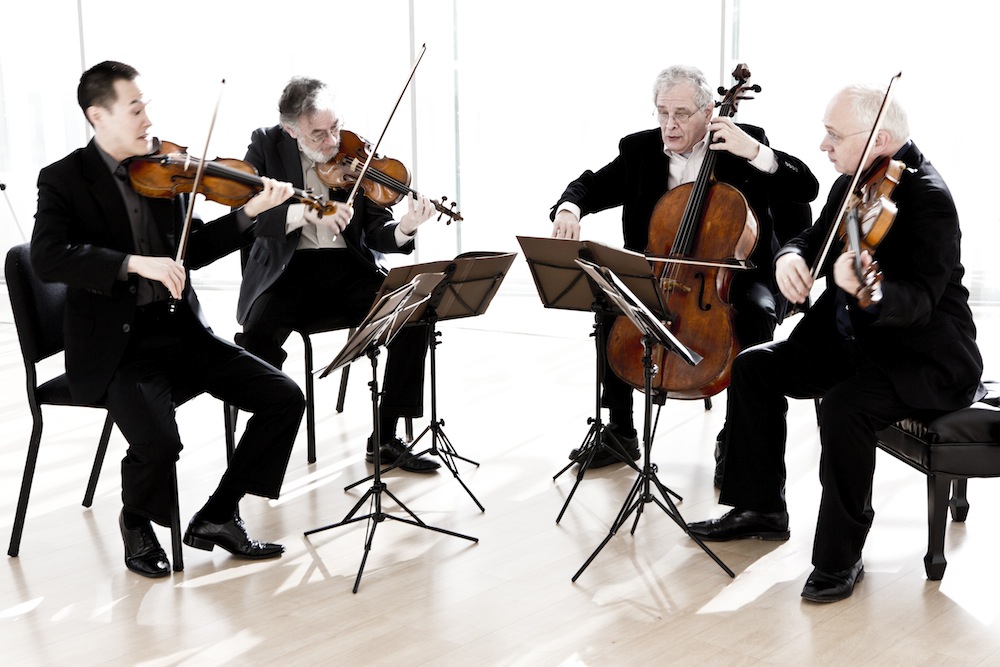A rejuvenated Juilliard Quartet impresses anew at Ravinia
A historic musical event took place a year ago at the Ravinia Festival when violist Samuel Rhodes played his final performance with the Juilliard String Quartet after a 44-year run. Last summer’s concert amounted to a changing of the guard with his successor, Roger Tapping, also participating in the evening.
The Juilliard Quartet returned to Ravinia’s Martin Theatre Monday night and, after a year of settling in with their new violist, the results were striking. While the ensemble felt like a group in transition last year, the Juilliard Quartet sounded rejuvenated Monday and delivered one of the finest chamber music events of the year.
First violinist Joseph Lin, the youngest member, has brought a fire and youthful energy that has meshed well with Tapping’s burnished viola and the ever-reliable second violinist Ronald Copes. Joel Krosnick is now the senior member of the group, notching forty years this season. While he didn’t always equal the force and technical gleam of his colleagues, the veteran cellist’s playing was never less than committed.
Music of Bach and Alban Berg opened the evening, with four excerpts from The Art of Fugue making an offbeat curtain-raiser. Bach’s serene polyphony was handled in a polished, warm-toned yet alertly blended manner with individual voicings always clearly defined. Lin brought a jaunty touch to the Contrapunctus II, and the ensuing inversion went with a patient, searching quality that felt somehow inevitable. A lithe and springy take on the Contrapunctus IV rounded off the set.
The serenity of Bach was jarringly contrasted with the ensuing Lyric Suite of Alban Berg. The Viennese composer’s modified serialism explores a daunting array of technical landmines and effects in its six movements, music that seems modern even today.
The players were clearly in synch with this challenging score and, led by Lin, dug into Berg’s quartet with alarming commitment. There was a nerve-jangling edge and apt fin de siècle expression to this performance, like a Klimt painting glimpsed in a distorted mirror. From the buzzing high harmonics to the rarefied pianissimos and jagged driving astringency, the Juilliard Quartet put across Berg’s restless fractured lyricism and searching desolation with daunting fury and intensity.
After that riveting performance, one might have though the program’s concluding Beethoven quartet would be an anticlimax.
Fortunately, there was no letdown for the vital and vividly characterized Beethoven Quartet in C major, which firmly sustained the momentum. In the third of Beethoven’s “Razumovsky” quartets (Op. 59, no. 3) the composer is still outwardly adhering to the genre’s traditions while expanding the scope, dimensions and expressive reach of the form.
From the darkly pensive introduction, the players segued into the animated Allegro with Lin’s athletic playing sparking some wonderful vitalized playing (albeit with some passing insecure cello moments). The Juilliard players gracefully brought out the lilting folk-like flavor of the second movement and a characteristic bumptious quality in the trio of the minuet.
The tearaway finale capped the evening—taken at a lightning pace with the main theme batted around between players made for an exhilarating coda, which brought the often undemonstrative Ravinia audience to its feet.
Pianist Garrick Ohlsson will perform a recital at Ravinia on 8 p.m. June 30. The program includes Beethoven’s Piano Sonata No. 30 in E Major, Op. 109; Schubert’s “Wanderer” Fantasy; Szymanowski’s Three Masques, and selections from Smetana’s Czech Dances. ravinia.org; 847-266-5100.
Posted in Performances



